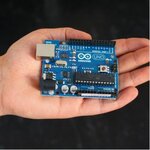farnoise
Newbie level 4
Hello All,
I guess I have the most general question to ask, I am a computer programmer, I mostly work with Pearl, Python, PHP, etc.. I very much like to get involve in Electronics. I'd like to start from Scratch and build my way up so I am looking for recommendations to get a book which talks about Analog/Digital circuit design, covering basics and at the end I be able to design a basic circuit.
Does anyone know a good book that I can start reading?
Thanks
I guess I have the most general question to ask, I am a computer programmer, I mostly work with Pearl, Python, PHP, etc.. I very much like to get involve in Electronics. I'd like to start from Scratch and build my way up so I am looking for recommendations to get a book which talks about Analog/Digital circuit design, covering basics and at the end I be able to design a basic circuit.
Does anyone know a good book that I can start reading?
Thanks
